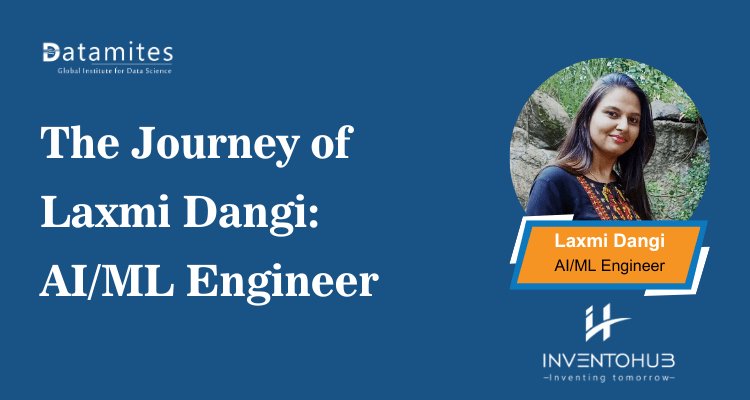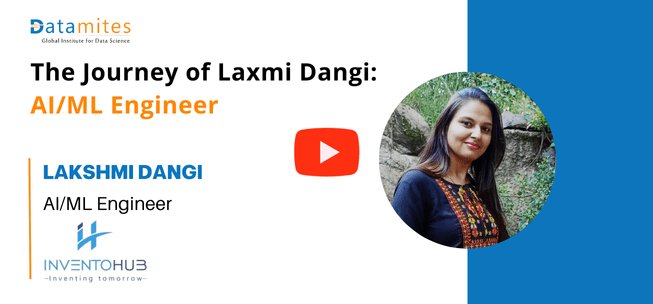Laxmi Dangi’s Journey as an Aspiring AI/ML Engineer
Discover Laxmi Dangi’s inspiring journey from a Computer Science graduate to an AI/ML engineer, learning key skills, tools, and strategies for success in the data science industry.

In a world where artificial intelligence and machine learning are reshaping industries, breaking into this competitive field can feel daunting especially for fresh graduates or career switchers. Yet, some stories inspire us to push boundaries and embrace learning with determination. Laxmi Dangi, hailing from Karnataka, is one such example. From mastering complex AI concepts to landing her first internship as an AI/ML engineer, her journey showcases the power of persistence, practical learning, and strategic preparation. Join us as we dive into her path, uncovering the challenges she overcame, the strategies she used, and the lessons every aspiring AI/ML professional can take away.
Exclusive Q&A Session: Laxmi Dangi Shares Her Inspiring AI/ML Journey
In this exclusive Q&A session, she shares tips, challenges, and strategies for aspiring data scientists.
Q1: Can you tell us a little about yourself and your background?
I’m Lakshmi Dangi from Karnataka. I completed my engineering in Computer Science, and later I joined DataMites, where I trained and got certified as a Data Scientist. After completing the course, I did an internship at Rubixe’s AI Solutions, where I worked on multiple projects. Currently, I’m working as an AI/ML Intern at Inventor Hub. I’m very thankful to DataMites for their support.
Q2: Is this your first job opportunity?
Yes, this is my first job. Before this, I hadn’t done any internship. My first real-world exposure was through the internship provided by DataMites with Rubixe’s AI Solutions, which gave me the confidence to step into the industry.
Q3: What tools and technologies do you use on a daily basis?
Most of the tools I use are the ones I learned at DataMites, like Python libraries, Jupyter Notebook, and different frameworks. While tools are important, I believe technology knowledge matters more. You can always learn a new tool, but understanding the underlying concepts and technology is critical for success.
Q4: Since you come from a Computer Science background, how did you manage statistics and mathematics in data science?
Initially, it was challenging because I didn’t have a strong statistics background. I had only studied it during school. When I joined DataMites, I found it confusing at first, so I spent extra time watching YouTube tutorials, online courses, and making notes. The statistics book provided by DataMites also helped me a lot. With consistent practice, I became comfortable with statistics and mathematics, which are essential in data science.
Q5: In your opinion, what are the most important aspects of data science?
Everything is important,Python, statistics, machine learning, and deep learning. Nowadays, job descriptions also demand knowledge in AI-related concepts. Data Science roles are evolving into AI Engineer roles, so one must have a good grasp of all areas instead of focusing only on one.
Q6: How important is the study environment while learning data science?
A peaceful environment is extremely important. For instance, Chatali, one of my peers, preferred studying in the library because it allowed her to focus without distractions. Limiting time on social media and unnecessary distractions helps dedicate more energy toward learning and improving skills.
Q7: How should freshers prepare their resume for data science roles?
Your resume should be tailored based on the job description (JD). Adding unnecessary information may lead to rejection. Include a brief overview of your projects and your GitHub link so recruiters can verify your work. Highlight your skills and algorithms that you know well. A well-structured resume reflects your focus and clarity.
Q8: How many projects should be mentioned in a resume?
It’s not necessary to mention all projects. Only include projects you are confident about and that demonstrate relevant skills. Other projects can be uploaded on GitHub, allowing recruiters to access your complete portfolio.
Q9: What was your experience with interviews, and how many did you attend?
It took time. Initially, my resume was not shortlisted for 3–4 months. I faced rejections, and in some cases, companies required assignments before technical rounds. Finally, I got an offer from Inventor Hub, and their interview was simple, only one round, mainly discussing my projects with scenario-based questions. Patience and persistence are key.
Q10: What is the main concept to learn before diving into deep learning?
Deep learning builds on the foundation of Python, statistics, and machine learning. As a data scientist evolving into an AI engineer, you cannot skip foundational concepts. Understanding the complete data science ecosystem helps you apply deep learning techniques effectively.
Q11: How long did it take you to land a job after completing the course?
It took time and effort. Learning data science is not instantaneous; building your portfolio, understanding projects, and preparing for interviews takes months. There are no shortcuts, but consistent practice and dedication eventually lead to success.
Q12: What advice would you give to aspiring data scientists?
- Focus on the basics first, they are the foundation of everything.
- Don’t just memorize algorithms; learn how to apply them in real-world scenarios.
- Be prepared for scenario-based interview questions.
- Keep learning new technologies, because job roles are evolving.
- Collaborate with peers, practice coding daily, and never stop improving.
Refer these below articles:
- Lavanya’s AI Success Story: From Programmer to Consultant
- From Data Analyst to AI/ML Engineer: Chaitali’s Inspiring Career Journey
- From Electronics to AI/ML: Ajay Yadav’s Path to Success
Key Findings from Laxmi Dangi’s AI/ML Journey
From mastering core concepts to navigating interviews, her experiences highlight the essential skills and strategies for success in the AI/ML industry.
Educational Background and Career Start
- Lakshmi holds a Computer Science engineering degree.
- She completed a Data Scientist certification at DataMites.
- Her first real-world exposure was an internship at Rubixe’s AI Solutions, leading to her current AI/ML internship at Inventor Hub.
First Job and Internship Experience
- This is her first professional job.
- Internship opportunities are crucial for gaining confidence and practical experience.
Tools vs. Technology Knowledge
- Daily tools include Python libraries, Jupyter Notebook, and frameworks.
- Understanding technology and concepts is more important than just mastering tools.
Handling Statistics and Mathematics
- Despite a lack of formal background, she improved through YouTube tutorials, online courses, and notes.
- Consistent practice made her comfortable with statistics and mathematics, which are essential for data science.
Core Aspects of Data Science
- Knowledge of Python, statistics, machine learning courses in pune, and deep learning is essential.
- Modern job roles often require AI-related concepts, as data science roles are evolving into AI Engineer roles.
Read these below articles:
- How Gradient Boosting Works in Machine Learning
- Generative AI and Predictive AI: Key Differences Explained
- Why Artificial Intelligence Matters More Than Ever
Lakshmi’s story proves that with dedication, structured training, and practical exposure, anyone can overcome challenges like career gaps or lack of a statistics background. From being a student at DataMites to becoming an AI/ML Intern, her journey is an inspiration for all aspiring data scientists. According to Grand View Research, the global call center AI market was valued at USD 1,998.7 million in 2024 and is expected to reach USD 7,084.7 million by 2030, growing at a CAGR of 23.5% from 2025 to 2030.
Pune, often referred to as the “Oxford of the East,” is rapidly emerging as one of India’s leading hubs for Artificial Intelligence Course in Pune. With a strong educational ecosystem, vibrant IT industry, and growing startup culture, Pune offers immense opportunities for AI enthusiasts and professionals.
DataMites is a prominent training institute that provides extensive programs in Artificial Intelligence, Machine Learning, Data Science, and other cutting-edge technologies. Students earn industry-recognized certifications accredited by IABAC and NASSCOM FutureSkills, and benefit from dedicated placement support, including resume preparation, mock interviews, and connections to professional networks. The DataMites Artificial Intelligence Institute in Pune offers training at its Kharadi and Baner centers, with flexible options for both classroom and online learning to accommodate different preferences.

